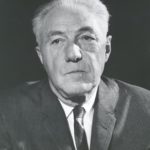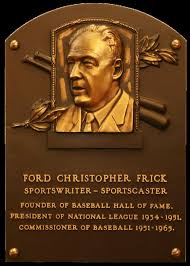Part One – Judge Kenesaw Landis
Part Two – A.B. “Happy” Chandler
Ford Frick Become Baseball Commissioner
In 1951, some baseball owners had become displeased with Happy Chandler’s service as the commissioner and did not want to renew his contract. In September, the owners elected Frick to replace Chandler in a twelve-hour meeting that the Chicago Tribune called “their all-time peak in dilly-dallying”. The owners were able to quickly narrow the candidates down from five unnamed candidates to two frontrunners, Frick and Warren Giles. The owners deadlocked until Giles decided to remove his name from consideration. Giles, who had been president and general manager of the Cincinnati Reds, succeeded Frick as NL president.
Frick agreed to a seven-year contract worth $65,000 each year. When he assumed the office, Frick said that he was surprised to be elected even though he knew he was a candidate for the position. Just before his announcement, the major league team owners voted that the commissioner’s office should be located in a city with two major league teams. Frick decided to relocate the office from Cincinnati to New York.
Removed Two from All-Star Team
In 1957, Frick addressed an organized campaign of ballot stuffing for that year’s All-Star Game in which most of the ballots originated from Cincinnati and had stacked the NL team with Reds. In response, Frick overruled the fan vote, removed two Reds from the starting lineup and appointed two replacements from other teams, and then took the vote away from the fans and kept it that way for the remainder of his tenure.
Frick presided over the expansion of the American and National Leagues from eight to ten teams. Faced with a Congress threatening to revoke baseball’s antitrust exemption, Frick had initially favored the development of a third major league within organized baseball but relented when the established league owners objected and pursued their own expansion plans. Following expansion, the regular season was extended to 162 games from 154 in order to maintain a balanced schedule.
Known as the Asterisks Commissioner
Frick’s most highly criticized decision as commissioner was to request baseball record-keepers to list the single-season home run records of Babe Ruth and Roger Maris separately in 1961, based on the length of the season played. Frick called a press conference to issue a ruling that a player must hit more than 60 home runs in his first 154 games in order to be considered the record holder. Writer Allen Barra points out that MLB had no direct control over any record books until many years later, and within a few years, all listed Maris as the single-season record holder. He writes that Frick and Ruth had been friends and that Frick was with Ruth on the player’s deathbed.
In 1960, Frick said that he would probably retire when his contract expired in 1965. He said that his remaining goals for his term as commissioner were to complete the expansion process and to convince Congress to allow each baseball league to set its own television policies.
Frick’s Early Life
 Frick was born on a farm in Wawaka, Indiana, and went to high school in Rome City, Indiana He took classes at International Business College in Fort Wayne, then worked for a company that made engines for windmills. He attended DePauw University, where he played first base for the DePauw baseball team and ran track. He graduated in 1915. He had been a member of Phi Kappa Psi fraternity. Frick came to Colorado to play semipro baseball in Walsenburg.
Frick was born on a farm in Wawaka, Indiana, and went to high school in Rome City, Indiana He took classes at International Business College in Fort Wayne, then worked for a company that made engines for windmills. He attended DePauw University, where he played first base for the DePauw baseball team and ran track. He graduated in 1915. He had been a member of Phi Kappa Psi fraternity. Frick came to Colorado to play semipro baseball in Walsenburg.
After his stint as a baseball player, Frick lived in Colorado Springs, Colorado. He taught English at Colorado Springs High School and at Colorado College. Frick moonlighted for The Gazette, covering sports and news until he left to work for the War Department near the conclusion of World War I. When the war was over, Frick worked in Denver for the Rocky Mountain News. Frick returned to Colorado Springs to take a job with the Evening Telegraph, which later merged with The Gazette. Around this time, he had given some thought to starting his own advertising agency.
In 1921, a flood devastated much of Pueblo, Colorado. When other reporters had flown in to cover the flood, their airplanes had become stuck in muddy conditions and they had been stranded in Pueblo. Frick had a pilot fly him there, but instead of landing, they circled low over Pueblo while Frick took notes and photographs. He was able to file his story a day earlier than other reporters. The recognition from the Pueblo flood helped Frick get a position with the New York American in 1922.
In 1934, he became the NL’s public relations director, and then became president of the league later that year.
In June 1937, Cardinals pitcher Dizzy Dean began to publicly criticize the NL and Frick. In response, Frick said that he was suspending Dean until the pitcher issued a written apology. Dean indicated that he would not apologize and that he would boycott the 1937 All-Star Game, suspended or not. The Cardinals made peace with Frick so that Dean could return to play. He appeared in the All-Star Game, but he sustained a toe injury in the game. The injury altered his delivery and he later injured his arm, never returning to All-Star form.
An American Communist Party newspaper known as the Daily Worker asked Frick in 1937 about the feasibility of racially integrating baseball. Frick said that there was no rule discriminating against players on the basis of race. He said that professional baseball required ability, good habits and strong character. He asserted that he was not aware of a case in which race had played a role in the selection of a major league player.
In the late 1930s, Frick played a central role in establishing the National Baseball Hall of Fame and Museum in Cooperstown, New York. He gathered a team of representatives from the major news wire services, including Davis Walsh of the International News Service, Alan J. Gould of the Associated Press, and Henry L. Farrell of United Press International. They took the idea to the Baseball Writers Association of America and that organization became the voting body for Hall of Fame elections. Later, during his tenure as NL president, when several members of the St. Louis Cardinals planned to protest Jackie Robinson’s breaking of baseball’s color barrier, Frick threatened any players involved with suspension.

